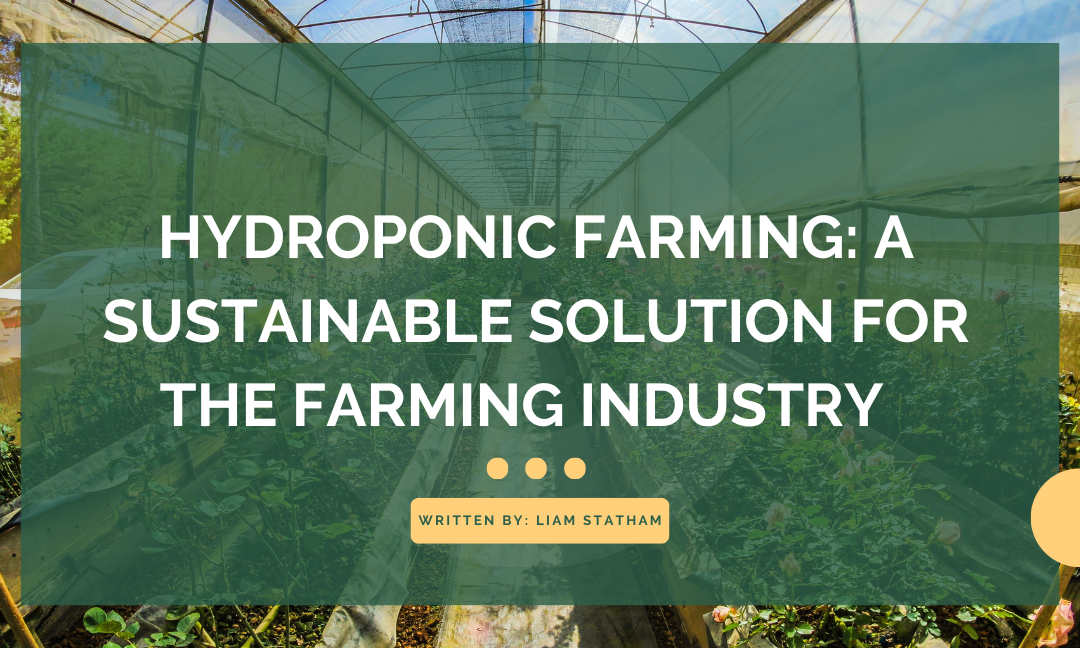Written by: Liam Statham
Edited by: Arcy Patel
Designed by: Jiya Mehta
Published by: Maryam Khan
In the ever-evolving world of agriculture, one new type of farming stands out as superior. This new method doesn’t use soil, doesn’t use pesticides, and doesn’t produce nearly as many greenhouse gas emission as traditional farming methods. It’s hydroponic farming.
What is hydroponic farming?
Hydroponic farming is a way of growing plants that doesn’t use soil. Instead, plants are grown with their roots directly in a mineral solution, where pesticides and other harmful chemicals are not needed. A combination of water and fertilizer are used to ensure exceptional plant growth. An environment is provided where nutrient levels and even light can be controlled to ensure optimized plant growth.
What are the benefits of it?
Water Efficiency. Hydroponic systems use much less water compared to traditional farming. It runs on closed-loop systems that recirculate water. Also, it is easy to prevent over-watering as a plant can receive the exact amount of water it needs for peak growth.- Space Optimization. Hydroponic systems can be designed vertically which leads to much more crops being able to be grown in a small space. This is key in providing a sustainable future, as forests will no longer need to be cut down to provide adequate farming space.

- Not dependant on soil. You may not have known it, but we are beginning to have a big soil problem. Good soil is becoming more and more rare, with the United Nations declaring that “soil is finite and there is predicted catastrophic loss within 60 years.” This loss of soil is partly due to unsustainable farming methods. Switching to hydroponic farming would ensure less damage to our soil and would also secure the ability to grow plants without soil.
- Year-round Cultivation. Hydroponic farming doesn’t just have environmental benefits! Because of the indoor climate, any plant can be grown any time of year!
- Enhanced Flavour. Crops produced with hydroponic farming are grown under optimal conditions, without the use of pesticides or adverse affects of poor soil composition. This leads to tastier produce!
In conclusion, in order to ensure that our agriculture industry remains strong and sustainable, we must switch to hydroponic farming. It is a significantly more sustainable method that provides a good long-term future for the industry, and has benefits for us consumers! The choice is clear!
Resources
Sources
Boylan, Camille. “The Future of Farming: Hydroponics.” Princeton University. November 9, 2020. https://psci.princeton.edu/tips/2020/11/9/the-future-of-farming-hydroponics
National Park Service. “Hydroponics: A Better Way to Grow Food.” Government of The United States.https://www.nps.gov/articles/hydroponics.htm#:~:text=Enhanced%20plant%20yields%3A%20Hydroponic%20plants,the%20same%20number%20of%20plants
Mccray, Nicole. “12 Pros & Cons of Hydroponic Farming.” Earth.org. February 12, 2023. https://earth.org/hydroponic-farming/
Jakiela, Kevin. “Social & Environmental Benefits of Hydroponic Farming.” Just Vertical. 2023. https://justvertical.com/blogs/podcasts/social-environmental-benefits-of-hydroponics-podcast-transcript#:~:text=So%20the%20resource%20efficiencies%20that,don’t%20use%20any%20pesticides
Miller, Andrea. “Why The Global Soil Shortage Threatens Food, Medicine, and The Climate.” CNBC. June 5, 2022. https://www.cnbc.com/2022/06/05/why-the-global-soil-shortage-threatens-food-medicine-and-the-climate.html#:~:text=Why%20the%20global%20soil%20shortage%20threatens%20food%2C%20medicine%20and%20the%20climate,-Published%20Sun%2C%20Jun&text=Soil%20can%20be%20considered%20black,catastrophic%20loss%20within%2060%20years
Images
Eden Green’s hydroponic vertical farm
https://www.edengreen.com/blog-collection/hydroponics-vs-traditional-farming
https://www.edengreen.com/blog-collection/benefits-of-hydroponics

